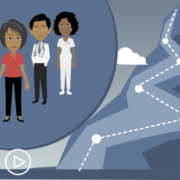Acute Myeloid Leukemia Care | Who Are the Essential Team Members?
Acute Myeloid Leukemia Care | Who Are the Essential Team Members? from Patient Empowerment Network on Vimeo.
Acute myeloid leukemia (AML) care is not just monitored by an oncologist or hematologist – there’s an entire medical team. Dr. Jacqueline Garcia, an oncologist and AML researcher, shares an overview of the various members of the healthcare team and the role they play in overall care.
Dr. Jacqueline Garcia is an oncologist and AML researcher at the Dana-Farber Cancer Institute. Learn more about Dr. Garcia.
Related Resources:

|

|

|
Transcript:
Katherine Banwell:
Typically, there are a number of team members to care for a patient. Who is part of an AML healthcare team?
Dr. Jacqueline Garcia:
Absolutely. We definitely cannot work on our own. Our team is very large, and it’s because these patients require a lot of support. At a bare minimum, a healthcare team will include at least one physician or an oncologist. The AML healthcare team might also include a second oncologist – that could be a bone marrow transplant doctor.
Other members that are very critical include having a mid-leveler available that’s a physician assistant or a nurse practitioner. Often, an oncologist who runs a busy practice, who takes care of patients that could be very sick, like AML, they work in partnership with often very talented physician assistants and nurse practitioners. I know I do.
In addition to that, I’m at an academic center so I’m super fortunate. I have really amazing and very smart hematology oncology fellows and residents that also follow to learn how to take care of patients. But we also, in the background, that patients don’t see – we have a pharmacist that helps us with making sure that drugs are prescribed correctly. They often call the patients with oral therapies to follow up. We have financial resource teams to help patients, to link them to LLS for support for bills that might come up, or transportation, or linking them up to other services that could help to defray or reduce costs.
So, the healthcare team is quite extensive. But in terms of those that are patient-facing, it’s primarily the MDM that are mid-leveler. Some teams operate also with a nurse or a nurse care coordinator. That’s pretty common, too. And that person helps to not only schedule but also to answer pages or phone calls from patients if the medical team is not doing that.
Katherine Banwell:
What about a social worker or psychologist?
Dr. Jacqueline Garcia:
Oh. Yes. Yes. So, absolutely. So, every patient can be offered, if needed, access to an inpatient or outpatient social worker. Often, if my patients are admitted we have them see a social worker because that’s fairly seamless. Otherwise, for outpatient, if we identify any particular needs or there’s an interest, we’ll link them up with a social worker. This is the same that goes for physical therapy, or nutritionists, or those other ancillary services that can be really critical when patients are getting started.



